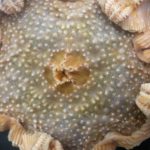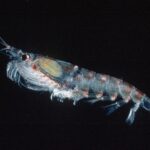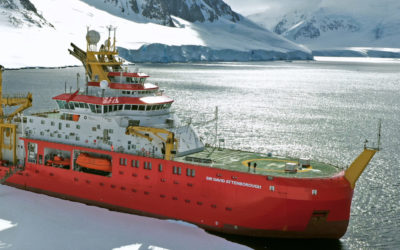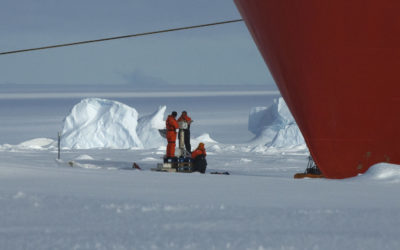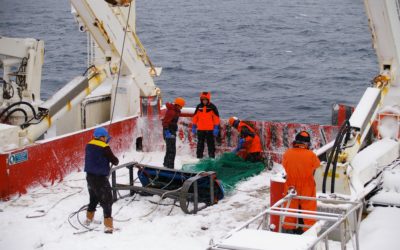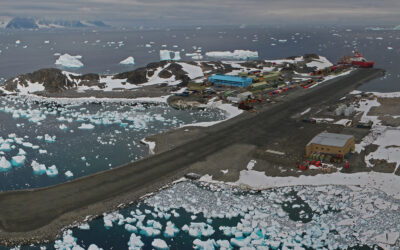The laboratory and workshop facilities on board the RRS Sir David Attenborough are key components of the ship’s design. They are essential for conducting science on board a polar research vessel. The RRS Sir David Attenborough has over 750 m² of built-in laboratory space, significantly more than the space available on RRS James Clark Ross. The ship is designed to also have space for at least 10 scientific containers – standard 20ft ISO containers adapted to support science, two of which can be placed indoors in the hangar, and two which can open directly into the wet lab.
Fixed laboratories
Modern research vessels are configured to have a small number of large, multipurpose labs – this makes the ship more flexible and optimises use of space.
Multifunctional facilities include ‘wet’ labs, ‘dry’ labs and temperature-controlled ‘cold’ labs for biological, chemical and physical analysis, as well as a number of specialist laboratories for trace metal chemistry, atmospheric and sea water analysis. There is also be a scientific walk-in -20°C freezer and several -80°C ultra-low temperature freezer units.
The full lab list is:
- Wet lab – located close to the moon pool. Most samples will initially enter this lab after being received on deck
- Deck lab – used for semi-dry or dry sample processing and analysis
- Main lab – the largest on the ship, with a 12-screen video wall so it can be used as a communications hub, or for running science operations
- General purpose lab
- Two temperature-controlled labs – where samples can be held at ambient seawater temperatures
- Clean chemistry labs – used for processing water samples for trace metal analysis or experiments
- Uncontaminated seawater labs – temperature-controlled lab enabling samples and equipment to be held at ambient seawater temperatures. Used to sample analyse and analyse uncontaminated seawater from 4m below the surface. The seawater enters the ship via the hull and is pumped to the lab which is located close by, to try and minimise changes to the seawater properties e.g. temperature. Measurements include temperature, salinity and CO2 concentration. Once analysed, the seawater is sent to other labs with seawater taps.
- Atmospheric science and aerosol labs
- Salinometer room – used to store and analyse salinity of seawater samples. Has a very stable temperature of 21 degrees as salinity is very sensitive to temperature changes.
- Dark room – a small, light-sealed space used for experiment requiring reduced light conditions, such as bioluminescence experiments
Containerised laboratories
All modern, large multidisciplinary research vessels are designed to accommodate mobile, containerised labs which can be set up temporarily according to need. The reconfigurable space and containerised laboratories makes science on the RRS Sir David Attenborough much more flexible over lifetime of the vessel, as technologies and techniques evolve. These containers can be fitted out with a wide range of equipment, enabling greater flexibility both now and in the future. For example, biogeochemistry cruises typically require lots of lab space, which can be provided through a combination of built-in and container labs. In contrast, geological cruises require maximum clear deck space.
The RRS Sir David Attenborough has 29 container positions and can accommodate up to 17 containers at once.
The lab containers include:
- Radionuclide lab container – typically used on biogeochemistry cruises to measure phytoplankton, for example
- Clean chemistry lab container – no exposed metal surfaces to provide a space for analysis of trace metals and other clean lab activities
- Experimental aquarium lab container – wet area with constant temperature seawater aquarium facility
- Multi-sensor core logging lab container – space for safe storage and use of the multi-sensor core logger which allows continuous, non-destructive, on-ship analysis of the physical and chemical properties of marine sediment cores.
21 March, 2023 by
Huw Griffiths
We are marine biologists that study seafloor creatures, Jamie is doing a PhD investigating Antarctic sea spiders in the University of Galway and Huw works at BAS. Both of us …
CONSEC is addressing the challenge to understand the links between the biodiversity, structure and function of Southern Ocean ecosystems and the impacts of rapid environmental changes to improve scientific knowledge …
